By David Jackson/reporter
Hip-Hop music has faced a decline in sales recently with only two albums going platinum (T.I.’s King and Gnarls Barkley’s St. Elsewhere) last year.
The decline can be charged to piracy, bootlegged albums, downloads from the Internet and mix-tapes of yet-to-be released material.
Record label executives are trying to figure out how to stop piracy but have had little success.
According to the New York Times, local authorities in Georgia raided the studio of DJ Drama and DJ Don Cannon and charged them with racketeering.
Investigators seized nearly 81,000 possible pirated CDs.
Drama and Cannon were producing unlicensed recordings and selling them without permission.
Agents of the Recording Industry Association of America believe that mix-tapes, and not piracy, are the major reason why hip-hop sales have declined over the past years.
An RIAA agent said in a recent issue of the New York Times that sales are undermined when mix-tapes from promotional items replace an artist’s actual label-distributed album.
The RIAA agent believes hip-hop itself is to blame because of promotional sales.
A recent issue of hip-hop magazine The Source explained why the Internet is hurting the sales of hip-hop music.
Artist Lupe Fiasco sold only 195,095 copies of his debut album Food & Liquor. The poor sales are attributed to bootlegging before the scheduled release date.
Fiasco pushed the release date of his album back. He added new tracks and removed a few in an effort to help his album sales.
Sales from veteran rap artists did not do that well either. Busta Rhymes’ The Big Bang only sold 574,900 copies; Ice Cube’s Laugh Now Cry Later album sold an estimated 477,500 copies, and new artist Yung Joc sold 815,507 copies of New Joc City.
Several hip-hop magazines have rating systems to advise music listeners what to buy, but they do not impact where a person buys.
TCC students have mixed feelings about the situation of hip-hop and downloading or mix-tapes.
“ There’s nothing wrong with mix-tape albums because they give you the music people want to hear without buying the artist’s entire album, “ Irri Young on South Campus said. “You get more for your money when you buy mix-tapes compared to solo albums.”
Byron Jennings on NE Campus downloads music because it saves him money. He does not want to buy an album that might not be that good.
Carey Richardson, student on NE Campus, said, “I believe it’s wrong for people to buy bootleg albums because it’s stealing from the music industry of the hard work they put in to entertain people.”
Jessica Lewis on SE Campus thinks bootlegging music is not wrong because professional musicians have money, and it saves her money.
Hip-hop industry executives are trying to figure out how to recoup some of the money they lost last year.
Record companies are learning they can make money with ringtones and make up for the loss on record sales with the sale of ringtones.
But the industry is also trying to cut down on piracy.
In recent years, the music industry has had to deal with piracy and battles with the Web site Napster over piracy and file sharing.
The music industry is trying to prevent piracy and file sharing as much as possible, but with the Internet and various Web sites, the job is increasingly difficult.


























